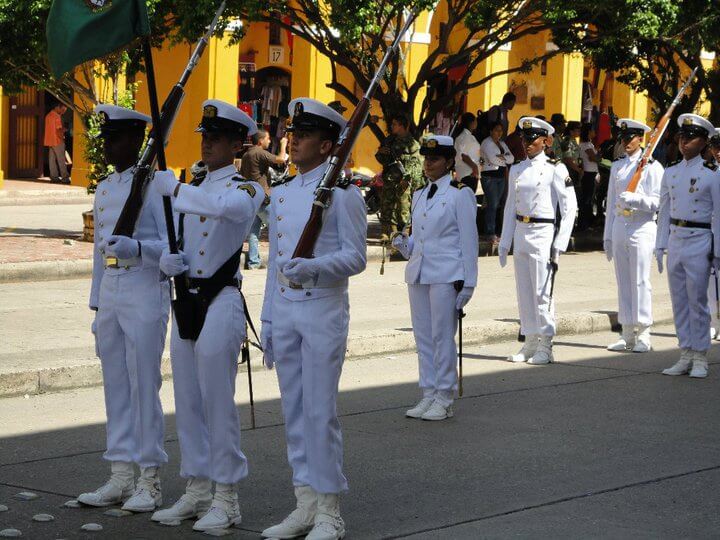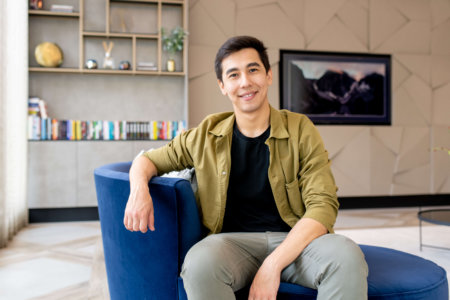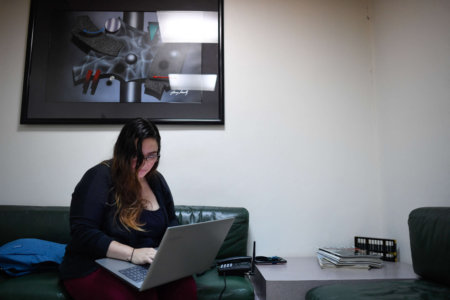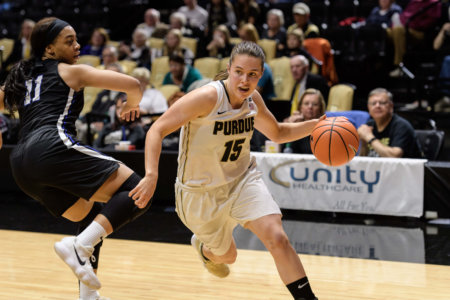
Marjorie Ramos, a Colombian Purdue University Global student, grew up with a mother passionate about learning English and an army officer father. Seeing the mental and physical effects armed conflict had on him, she was spurred to study psychology from him and English from her mother. She even joined the Colombian Navy — for a different purpose.
For 11 years, Ramos supported the mental health of the people who were risking their lives, their families and their health to protect their homeland. The importance of her role could not be understated — war is one of the leading causes of post-traumatic stress disorder and can lead to addictions which is not an uncommon thing.
Today, she’s studying psychology via an online degree by Purdue University Global (which is based in Indiana) because she can’t stand the thought of being away from her children. We caught up with her via email to learn more about her passion for psychology, her time in the navy and the advice she would give her younger self:
Tell us about your passion for psychology and your experience in witnessing the effects of the war on your father.
I decided to study psychology when I finished high school back in 1997. I’ve been in love with my career since my college days at Pontifical Xavierian University in Colombia.
I’ve never stopped being a scholar and a practitioner as I always had a knack to learn and be more involved in the psychology community. This includes working in different conventions, organisations, and associations.
My first thesis in my college was about a case of anorexia nervosa with animal-assisted therapy. I did an internship in the US at the United Cerebral Palsy in Manhattan for about a year. There, I worked with adults and children as a case manager and service coordinator with cerebral palsy and other disabilities.
I went back to my country to work as an officer of the Colombian Navy after that. I worked there for 11 years before I began my job as a psychologist with a military population. I was influenced to do this by my father because of his experience in the army.
I saw how passionate he was to do his job and how he helped our country by working hard for more than 50 years. From my personal experience, I found out about the importance of working as a psychologist and working with the military population and their families.

With an avid passion for mental health, her 10 years of hard work in the navy has geared Ramos to pave the way with high standards in her psychology practice. Source: Marjorie Ramos
I did this in different regions of Colombia and even in the capital city of Bogota. It was a learning experience in which I was able to use the knowledge as well as continue to study human resources and clinical psychology. I was able to finish two theses within those specialisations for the military population.
Why choose Purdue University Global in particular?
I decided to study at Purdue University Global after changing my pathway to a different perspective. I realised the vulnerabilities in me not being present in my children’s lives due to my hard and demanding work.
From this, I had to turn my career to a different level in order to give my children and family more emotional support. I was looking to study at an online uni because it’s the only way for me to be close to my husband and kids.
At first, I looked at online unis with Spanish programmes in South America and Spain. I was also on the lookout for financial assistance so I wouldn’t have to bear the burden of high costs.
I decided to research through the American Psychological Association that has a programme designed to help in the search for high-quality unis and this led me to Purdue. My brother, an American citizen who’s lived in the US for more than 15 years now, had great things to say about it and helped me with my application process.
Walk us through your educational journey and what you plan to do with your degree after.
I have finished my internship at Pathways Mental Health and Mental Health First Respondent (MHFR) with Dr. Art Tolentino. Now, I’m still volunteering with MHFR and we have a project to implement in Colombia.
I also have my private practice here and I would like to pursue a PhD in Psychology programme after. I’m currently in a programme by the American Psychological Association from the grad students where we share information with other students.

Now, she’s doing an online degree in psychology at Purdue University Global (which is based in Indiana) because she can’t stand the thought of being away from her loved ones which include her children. Source: Marjorie Ramos
What’s it like studying psychology with Purdue?
I’m currently the president of Purdue Global’s Psi Chi Honour Society in Psychology. We work in this field and contribute to inclusion. Thanks to this society’s support and the scholarship I received from them, I can continue my thesis without worrying about my expenses at uni.
The following two terms will be covered which will help me focus on studying psychology instead of taking time to find resources.
Do you have any fond memories with teachers at Purdue University Global that have stood out for you?
Dr. Julee Poole, the chair of the Academic Department, is always available. My current thesis advisor, Dr. Gabrielle Blackman, is also the Psi Chi Faculty advisor and has been very wise and helpful during my studies.
Dr. Art Tolentino and Dr. Kenneth Martz have also been great at teaching me all their knowledge which has helped me grow as a graduate student.
What are you focusing on now?
Health is an important factor for humans, especially during COVID-19. Helping individuals manage their mental health is a priority in our societies.
This is because we work on balancing people’s behaviours, thoughts, and emotions and at the same time, influence our societies, families, schools, and work environment.

“I went back to my country to work as an officer of the Colombian Navy after that. I worked there for 11 years before I began my job as a psychologist with a military population. I was influenced to do this by my father because of his experience in the army,” she says. Source: Marjorie Ramos
If you could turn back the clock and give yourself some advice, what would it be?
Deciding to change my pathway to spend more time with my children was a challenge. I would tell myself that I made a good decision by doing that because children are the base of society and someone needs to take care of them in order for stability.
I can’t compete by being the most successful person with a high salary. However, I can do it from my own needs and still continue to grow as a woman, a mother, and a professional. I can contribute to psychology and humanity without risking my family.
In your opinion, what matters more to you: work satisfaction, salary, social life or a work/life balance?
Psychology is about balancing our lives as it matters a lot to me to be able to apply what I’ve learned in my career and what I tell my clients. I’ve learned a lot from my professors at Purdue University Global.
Lastly, do you have any budgeting tips you can share with students?
I usually do not like to own money and for that purpose, I worked first, saved money and have been paying for most of my degree with my savings. Other than that, I also have my current job and the scholarship definitely helped.










